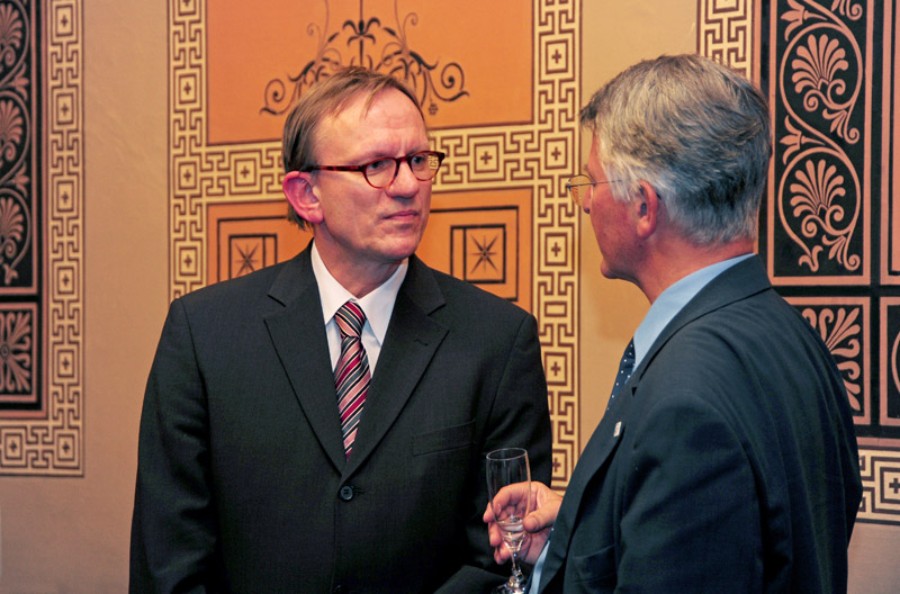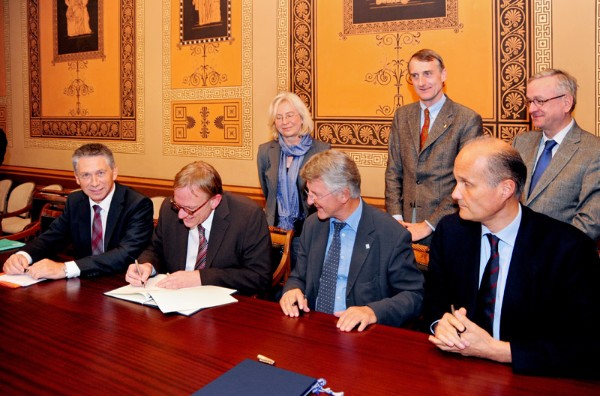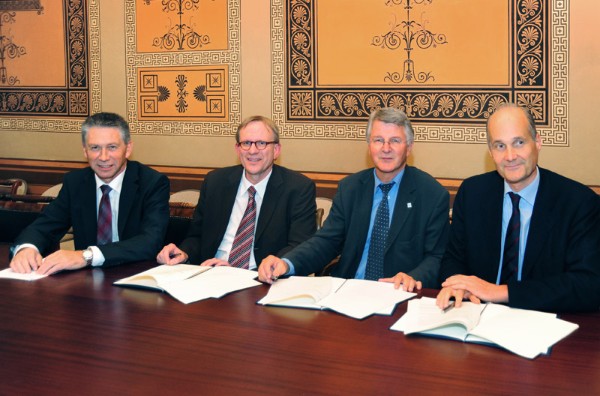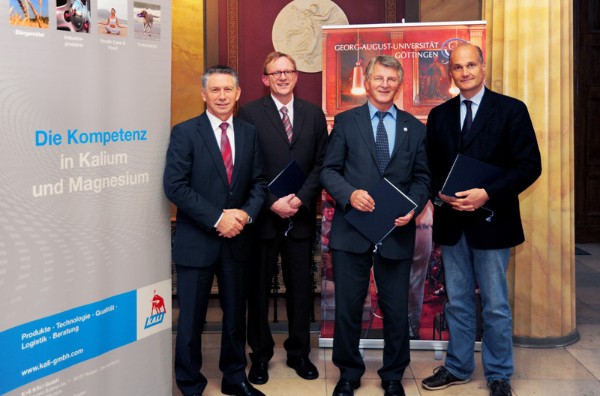Nov 18, 2010
Interview with Prof. Dr. Gransee, on the foundation of the Institute of Applied Plant Nutrition – IAPN
Prof. Dr. Andreas Gransee, the head of the K+S KALI GmbH’s Agricultural Advisory Department, has played a decisive role in the establishment of the university-affiliated Institute of Applied Plant Nutrition – IAPN at the Georg-August-University in Göttingen. In this interview, he will provide information on the foundation’s background, and will shed light on its future activities.
Prof. Dr. Gransee (left) in conversation with Prof. Dr. Dr. h.c. Kurt von Figura, President of the Georg-August-University Göttingen, after signing the contract on the foundation of the IAPN (photo: K+S KALI GmbH)
Conclusion of the contract, on 4 November 2010 (photographs: K+S KALI GmbH)
Why does K+S KALI GmbH commit to university research?
Prof. Gransee: Ever since its foundation by Liebig, scientific research on plant nutrition has had a great tradition in Germany. It has been instrumental to the significant yield increase of crop plants. This necessity still exists today, and it will continue to exist in the future. But more and more, it is not just volume, but also specific plant qualities that are required for specific uses. And similar to quantity, quality is greatly determined by nutrients.
Another issue that is fast gaining importance is sustainability. In future, the question that we must answer is how intelligent nutrient management can support a more efficient use of limited resources, such as water and arable land. For this purpose, the IAPN will focus on application-oriented research, both on plant nutrition as well as on fertilisation. In recent years, a chronic shortage of public funds and differently set priorities has detracted from these research objectives.
What are the specific advantages of the IAPN?
Prof. Gransee: The IAPN fosters a dialogue between research and practice, which may surface totally new questions and help to identify seminal issues. These may then be implemented as concrete research projects.
The IAPN will aim at becoming a beacon authority on fertilisation issues, and at contributing to sustainable agriculture, worldwide. It will work in an interdisciplinary fashion, with attention also given to the challenges created by the transfer of knowledge to agricultural practice. The institute will work internationally, but will be regulated by German scientific standards.
Networking with the university will assure that new research results will quickly find their way into teaching. This will contribute to the excellence of the university training, and to preparing students to be experts fit for the future.
Which will be the IAPN’s central topics?
Prof. Gransee: Some of the very interesting topics to be dealt with are:
- Raising yields with scientifically-founded nutrient management,
- Improving efficient use of resources with nutrients,
- Nutrients/Fertilisation and quality of plant products,
- Nutrients and stress-tolerance in plants, under changing climate conditions
- Connection between fertilisation and water use efficiency in the soil/plant system
- New processes for improving fertilisation recommendations
These are just a few examples for seminal research questions. A major focus of the IAPN activities will be on the nutrients potassium, magnesium and sulphur, but without loosing sight of other important nutrients. Our approach of intelligent nutrient management has always been governed by the principle of “balanced nutrition”, as this is the only way to achieve maximum efficiency of the individual nutrients.
Which role will the IAPN play for already existing research activities?
Prof. Gransee: K+S KALI GmbH already has an excellent store of knowledge on plant nutrition, and has for a long time been cooperating with both domestic as well as international research partners. The IAPN will serve to bundle available resources and individual projects. Our objective is to avoid insular solutions in research and development. A preferable option is the creation of networks, which can provide a boost to application-oriented research.
Choosing Göttingen as the Institute’s location clearly has the benefit of allowing cooperation with the K+S Research Institute in Heringen. In Heringen we have got state-of-the-art instruments for analysis, which in future will also be used for analyses in agricultural research. The great advantage for the university is that scientists as well as students will have access to advanced analysis technology.
Will the Agricultural Application Consultation of K+S KALI GmbH draw a benefit from the work done by the IAPN?
Prof. Gransee: Yes, we can assume that to be true. In addition to research, the transfer of knowledge will be a central aspect of the work done at the IAPN. This is particularly relevant for so-called Third World countries, were answers are needed on how to transfer existing knowledge to farmers, so that application in agriculture can take place.
Of course the agricultural application consultation of K+S KALI GmbH will also be instrumental in spreading the knowledge created at the IAPN to practice, such as on intelligent fertilisation systems. In so far, it is not only us who will draw a benefit from the research conducted at the IAPN, but mainly farmers themselves, worldwide.
How will the IAPN be funded?
Prof. Gransee: The IAPN will be funded by the K+S An-Institutsverwaltungs GmbH. This is a 100%-subsidiary of K+S KALI GmbH. This management company will finance the IAPN’s staff. The team will be made up of a junior professor, one PhD-student and one technical assistant. Beyond that, K+S KALI GmbH will also grant a one-time seed capital to the affiliated institute, and will provide additional funds for specific projects.
The University of Göttingen will provide the premises at the Faculty of Agricultural Sciences, and will bear their operating costs. The full professor to be appointed to the Chair for Plant Nutrition at the Department of Crop Sciences of the Georg-August-University will scientifically supervise the IAPN, and will have 20% of his working hours available for that.
Which will be the next steps for establishing the IAPN?
Prof. Gransee: After completion of the reconstruction tasks at the Carl-Sprengel-Weg in Göttingen, the institute will be provided with the necessary technology: with laboratory equipment, computers, and all of the tools necessary for running a research institute on plant nutrition. In parallel, recruitment for the positions mentioned will take place. After these positions have been filled, the work can begin.
The interview with Prof. Gransee was conducted by Steffi Weiß, member of the Internet editorial staff of the K+S KALI GmbH.






